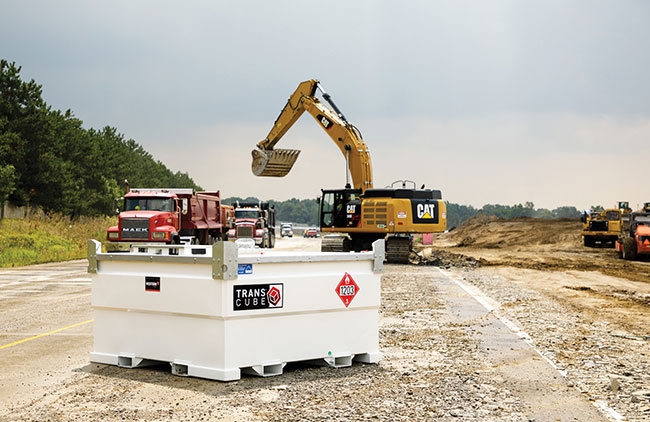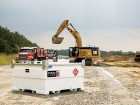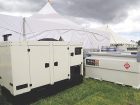
Portable fuel tank rentals: Easy money
By John Cleary
Features Products Tech tips businessEasy money is hard to come by for most businesses. Yet, in the equipment rental industry, many companies pass up easy money year after year by not offering a product that a majority of their customers need at one point or another: fuel tanks.
 Approximately 98 percent of energy consumed at construction sites comes from diesel Easy money is hard to come by for most businesses.
Approximately 98 percent of energy consumed at construction sites comes from diesel Easy money is hard to come by for most businesses.Regardless of the equipment, if it runs on diesel it will eventually require refuelling. Since 98 per cent of energy consumed at construction sites comes from diesel, offering customers a convenient, cost-effective solution for refuelling should be a no-brainer, especially if there’s an opportunity to earn easy money in the process. However, since tanks are not always perceived as a core rental product, this opportunity is often overlooked. Before investing in a fleet of fuel tanks, here are a few things to consider.
Deceptively High ROI
The fact is, fuel tanks have ROI potential that far exceeds most other construction rental equipment. They have a low purchase price, minimal cost to own and typically experience high rental rates. Additionally, fuel tanks require little maintenance outside of statutory two-and-a-half- and five-year inspections, as they have no moving parts such as gearboxes, hydraulics or engines.
To demonstrate the ROI potential for rental tanks, here’s a scenario using actual data from a large rental company.
Rental Company X purchased 25 tanks of varying capacities at about $5,500 each. The parts, labour, maintenance and inspection costs per tank, on average, were $129 per year. That brings the 10-year cost to own to about $6,790. Considering a 10-year-old tank retains about 40 per cent of its original value when sold at auction — a $2,200 value in this case — the total yearly investment per tank is only $459. Meanwhile, the company rents the tanks for $500 per month with a 70-per cent utilization rate, generating average annual revenue of $3,741 per tank — about 800 per cent more than the cost to own. Multiply that by 25 tanks rented over 10 years before being re-sold and the potential revenue easily exceeds $930,000.
Returns like this are virtually unheard of with other rental equipment. And, considering the value and convenience that rental tanks provide customers, they aren’t a hard sell at the counter.
Develop A Plan
While many rental companies already embrace the high ROI of tank rentals, those looking to add fuel tanks should start by completing some homework. A good place to start is by having conversations with existing clients about their current refuelling methods and any frustrations they face. Also, speak with local fuel vendors to explore opportunities for business partnerships and options for getting set up to sell fuel on site — another complementary revenue source.
Once the decision is made to add rental tanks, it’s important to determine rental prices, as well as rates for pumps, fuel and any other services. In addition, ensure that all appropriate legal, licensing and regulatory steps are in order for handling and transporting tanks as well as selling fuel.
Finally, create a strategic marketing and sales plan and ensure all employees are trained and fully understand the benefits, features and value of tank rentals. To help employees determine whether to suggest a fuel tank, make it simple. Some companies incorporate reminders within the computer system, complete with a pop-up box to prompt associates to recommend a tank when a customer rents certain equipment. Another simple rule: If a customer rents two or more pieces of equipment for two or more weeks, a fuel tank should be suggested as part of the rental. Also, adding reminder decals near the fueling points on diesel equipment can help get customers thinking about the benefits of a tank early in the process.
Once a business plan is set, find tanks that will make rentals as easy and profitable as possible.
Choose Tanks Designed for Rental
Not all tanks are designed for rental. Choosing tanks that are can be the difference between revenue and regret. While round tanks are common due to low manufacturing costs, they’re not as rental-friendly as new cube tank designs. Cube-shaped rental tanks are often built and approved for being transported while full. Round tanks, meanwhile, need to be emptied and cleaned before moving. Transporting full tanks also eliminates the need for the initial fuel delivery once tanks arrive at a customer’s site. And when the rental is complete, cube tanks can be collected with fuel still on board, which can often be reclaimed by the rental centre.
Tanks designed for rental should also be easy to load and secure on a truck bed or trailer. Some tanks feature four-way forklift pockets for simple loading and unloading as well as crane hooks built into the tank frame. The sturdy steel frames on some cube tanks allow them to be stacked, too, so they take up considerably less space at the rental yard than round tanks of the same capacity.
Another tip to ensure success is to work with a tank manufacturer that simplifies the buying and renting process for rental centres. Some leading manufacturers deliver tanks rental-ready with all meters, pumps, vents and other accessories installed, reducing labour and setup costs for rental dealers. Some manufacturers will even work with rental companies to develop successful promotional strategies, including marketing ideas and proven solutions for increasing rental rates. For example, the manufacturer might customize a tank to prominently display the rental company’s name and logo or even powder-coat it in branded colours, which turns each tank into a mobile billboard that will spend a majority of its time at jobsites in front of potential customers.
To determine the demand and better gauge customer interest, it may be best to start with a small inventory of tanks before making a more significant investment. More often than not, however, rental managers end up asking themselves why they left easy money on the table for so many years.
So, if you’re in the business of renting diesel-powered equipment and are not taking advantage of the additional revenue available with tank rentals, it may be time to consider making fuel tanks one of your company’s core rental products.
About Western Global
Western Global is an international designer and manufacturer of industry-leading tanks and equipment for fuel and fluid handling. Building on a legacy that spans five decades, Western Global offers a wide range of solutions for the safe transportation and storage of fuel, diesel exhaust fluid, lubricants and more. Because every application is unique in its operational storage needs, Western Global engineers industry-specific solutions to ensure success in all of your business endeavors. Learn more at western-global.com or connect on social media: Facebook, Twitter, YouTube and LinkedIn.
Print this page


Leave a Reply